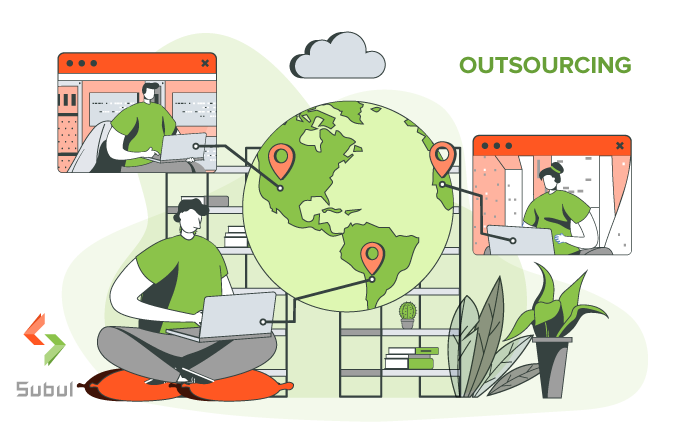Outsourcing has become a standard company practice since investors started looking for less expensive ways to complete different tasks.
These same innovators have been using the term "offshoring" for the past 20 years.
Impact Sourcing? That is a more recent one. More enterprises are shifting to impact sourcing to promote inclusivity by supporting shared values and CSR (Corporate Social Responsibilities).
Impact sourcing is an emerging business strategy producing significant social and financial benefits. In this article, you can learn more about impact sourcing and how it may help your company.
What Is Impact Outsourcing?

In essence, impact sourcing is a strategy for redistributing outsourced/ offshored digital work to people and places that might not have access.
Based on this description, it may be said that Impact Sourcing merely moves jobs from second to third-tier regions. Indeed, that might be true for some businesses.
Any comprehensive definition of "impact sourcing" must also consider how employees and employers view their interactions with one another and their jobs. That experience sets Impact Sourcing apart from typical moves for digital employment.
Impact Sourcing is a socially conscious division of the information technology and business process outsourcing sectors that specifically hire people with little access to long-term work opportunities, typically in low-income regions.
Impact sourcing gives companies more thorough exposure to underutilized talent pools and recently identified skills/ talents.
On the other hand, it also aids in providing learning and professional development possibilities to underprivileged workers with limited resources.
Outsourcing companies in the USA should prioritize sustainable development ideas and initiatives if they want to make a difference.
This could imply various things, from emphasizing regional jobs to uplifting disadvantaged individuals.
Impact Sourcing Examples

A good example of impact sourcing is when American-based service providers procure call center services from foreign companies in India. Rather than spend money constructing, managing, and staffing its call center, it is cheaper for a startup business to outsource these services from a dedicated service provider. This way, the company can focus its personnel and finances on growing its product or service.
Impact Outsourcing Services

1. Customer Service Outsourcing
Customer service outsourcing is a standard business strategy for hiring a third-party firm to manage your customer care operations, whether voice or non-voice.
You will contact your customers regarding their questions, issues, and other inquiries on your services or products through the customer care provider you hire.
2. HR Outsourcing Services
HR outsourcing refers to a legal arrangement between a company and an outside service provider under which the employer cedes management and control of specific Hr processes to the external provider. Employers have access to a wide range of HR outsourcing solutions, such as outsourcing only a component of a single HR function.
3. IT Outsource Services
IT outsourcing involves contracting with a third party to manage your IT requirements. An external managed service provider (MSP) such as Subul services can handle anything from network security and operating system implementation to software installation and file backup.
Remember that outsourced IT services go beyond simple break/fix. When anything breaks, a break/fix operator comes to your location and charges an hourly rate to identify and remedy the issue. This costs more in the long term.
An MSP establishes a relationship with your business and continuously monitors your system in exchange for a monthly charge. MSPs are more motivated to provide a quick, dependable fix should anything go wrong because they are there to maintain your system operating efficiently, not merely to cure faults.
4. Call Center Outsourcing Services
Call center outsourcing is when a company engages an outside management company to staff and run its call center from a different location.
It can enhance customer satisfaction by improving your company's efficiency in crucial areas. Call center services offer a variety of resources as part of BPO, including appointment-making, telemarketing, help desk support, marketing, talent recruiting, and finance.
5. Outsource Data Entry Services
Data entry outsourcing is employing outside assistance to manage your company's data entry needs.
Jobs in data entry could include transcribing a handwritten document, claims data entry, product data entry, filling in MS Excel sheets, etc.
Saving time and money is the primary goal of outsourcing data entry.
You can readily concentrate on critical business operations like finance and marketing since a third party will take care of the responsibilities.
6. Outsource SEO Services
SEO outsourcing occurs when a business asks a specialized SEO provider for help developing and executing an SEO strategy.
Companies frequently outsource SEO work to address several issues:
- The company needs more capacity, materials, and equipment to finish the services.
- The company needs to gain expertise and knowledge in more complex SEO techniques.
- The company is interested in offering white-label SEO services. It can incorporate a new source of income without exposure to the risk and incurring the overhead expenses usually associated with in-house operations.
7. Machine Learning Data Annotation Outsourcing
Outsourcing data annotation relieves machine learning experts from tedious labeling and tagging activities, enables contextual versatility and fast execution, and shifts quality attention to ML development.
Outsourcing these services from a reputable provider like Subul services provides the organizational performance needed to create performance-driven AI networks.
Outsourcing Effects On Businesses

Outsourcing business services has numerous effects on companies and local communities as well.
What are Some Benefits of Outsourcing?
Impact sourcing practitioners argue that this organizational technique is more than cutting costs. Ultimately, it is about affecting the lives of countless individuals and bringing about real social change.
The following are some outsourcing benefits:
1. Outsourcing Reduces Entry Barriers and Boosts Competition
By outsourcing, new players can enter markets where labor might be prohibitively expensive.
A startup looking to produce electronic products may not get off the ground if it needs to employ American factory employees. Instead, it can readily locate a willing and inexpensive trained workforce elsewhere. Entry barriers that previously existed due to the capital requirements necessary during the starting period can be significantly decreased.
By fracturing and rupturing the supply chain, outsourcing also fosters new competition. In other words, new competitors may enter the market to profit from the possibility that customer service and product design may be located in one area while manufacturing is located in another.
2. Save on costs
BPO is a rapidly growing sector that can open doors for many emerging nations. BPO service providers do, however, occasionally run into budgetary and personnel issues. Impact sourcing provides a remedy for this with a better workforce.
Impact employees are thought to be more engaged and less likely to leave their jobs. They also usually have lower labor costs than typical offshore and in-house employees.
3. Hire talented but underprivileged individuals
With impact sourcing, government agencies can connect with underserved groups in the community and provide them with the possibility to receive training and employment. Doing so will compensate for the skills shortage and even lessen the unemployment rate.
4. Reliable service delivery
Impact sourcing is a practice businesses are convinced will minimize service delivery risk. This is because employers ensure that all employees have the necessary training and orientation for skill development before providing a service.
5. Community Impact
All the above benefits of impact outsourcing are components of the value proposition formed around the fifth component, the social impact. In actuality, the types of workers hired are what give impact outsourcing its value proposition.
High-potential yet socially or economically disadvantaged workers are hired through impact sourcing. They might, for instance, be from a low-income community or have never had the chance to attend university.
These individuals have a chance to make money and develop marketable skills through impact outsourcing. Employees benefit both personally and for the benefit of their communities and families as a result.
What are the Consequences of Outsourcing?

Outsourcing has some negative aspects as well. These drawbacks should be considered when deciding whether a corporation should outsource.
1. It Erodes Company Loyalty
Employees could lose faith in their company and feel disheartened if they know that their position could be outsourced to less expensive overseas workers. Even managerial-level personnel cannot guarantee their positions are safe because outsourcing has expanded from low-skill jobs to encompassing managerial and intellectual professions.
2. Outsourcing May Result in Domestic Workers Losing Their Jobs
Despite the heated argument over whether outsourcing reduces employment or boosts it, it is undeniable that it does remove some types of work.
Today, a large portion of the products made by American businesses are created in foreign facilities. Although the contribution of U.S. manufacturing to GDP hasn't changed significantly, the nature of American manufacturing jobs today has altered.
Robotics, engineering, information technology, and precision equipment now account for the majority of factory jobs in the U.S. The repetitious manual, labor-intensive low-skilled employment has either been outsourced to low-cost foreign labor or automation. This has led to the virtual disappearance of entire villages and cities that depended on manufacturers and assembly lines.
3. Security Risks
Outsourcing companies can have access to critical information, e.g., from HR, recruitment, and Payroll. Additionally, companies are more vulnerable to cybersecurity risks due to rising SaaS usage. Businesses can alleviate these worries by:
- Verify the outsourcing company's background;
- Sign an NDA with the company;
- Establish a non-compete clause to guarantee that the company won't work on a rival project.
4. Quality Control is Lost
Outsourcing entails a certain amount of project control loss. Unlike internal teams, managers can only receive weekly updates and cannot oversee the work. It is crucial to establish effective contact with outsourcing companies to address this issue:
- Be clear about your expectations for quality
- Assign only portions of the project rather than the entire one
- Establish a schedule for the project.
- Look into the leading outsourcing companies.
5. Outsourcing Has an Impact on Developing Nations
In recent decades, China has become more of a worldwide exporting powerhouse, which has been partly credited with the rise of its middle class.
Chinese workers will start demanding better wages as more jobs are outsourced to that nation. Their edge in low wages could eventually disappear, along with the increase in the economic output it brought.
Additionally, outsourcing removes workers from a nation's workforce. It places them in jobs that are not essential to the growth or development of their own country but are nevertheless more lucrative. People might be persuaded to leave rural or small-town jobs to work in call centers in urban areas where wages are higher.
The flood of foreign investment, particularly in the industrial sector, can also result in an overabundance of companies that spew CO2 emissions into the environment, harming the health of the employees and neighboring populations.
The Role of Subul Impact Outsourcing

Subul is a social impact outsourcing company dedicated to empowering the less fortunate. If you are certain you want to begin outsourcing, why not do it in a socially responsible manner?
Subul provides precisely that. When you collaborate with Subul, you'll be able to accomplish your goals quickly while also having a positive influence. Contact them today to eliminate all your worries about quality control loss, security risks, and other outsourcing-related queries.
They achieve incredible productivity by recruiting, vetting, and training a tailored workforce based on your needs. They also work with dedicated partners to serve the underprivileged
Final Thoughts
More and more companies are adopting increasingly socially conscious employment and shared values thanks to impact sourcing strategies.
Impact sourcing can drastically alter a nation's economic and social picture by empowering its citizens. It gives leaders everywhere more justification to reconsider and reconfigure the part they play in promoting the opportunity for underserved populations.
Companies should start reevaluating their goals if the intention is actually to improve the lives of underprivileged people. Their primary objectives should be enhancing local industry, human resources, and quality jobs.
FAQ
What is the difference between impact sourcing and traditional outsourcing?
Impact sourcing differs from traditional outsourcing in its focus on social impact and inclusivity. While traditional outsourcing aims to reduce costs and improve efficiency by delegating tasks to external service providers, impact sourcing goes a step further by intentionally hiring individuals from disadvantaged backgrounds or low-income regions. It prioritizes creating sustainable job opportunities for those who may not have had access to long-term employment otherwise.
How does impact sourcing contribute to social and economic development?
Impact sourcing plays a vital role in promoting social and economic development. By providing employment opportunities to underprivileged individuals, it helps alleviate poverty and reduce unemployment rates. Impact sourcing also facilitates skill development and professional growth for workers who may have had limited access to training and education. Additionally, it fosters community development by empowering local talent pools and promoting inclusivity.
What types of services can be outsourced through impact sourcing?
Impact sourcing can encompass a wide range of services across various industries. Common examples include customer service outsourcing, HR outsourcing, IT outsourcing, call center outsourcing, data entry outsourcing, SEO outsourcing, and machine learning data annotation outsourcing. These services are outsourced to external service providers who prioritize impact sourcing as part of their business model.
How can impact sourcing benefit both businesses and underprivileged individuals?
impact sourcing offers benefits to both businesses and underprivileged individuals. For businesses, it provides access to underutilized talent pools and potentially lower labor costs. It can enhance efficiency and service delivery while also aligning with corporate social responsibility (CSR) goals. For underprivileged individuals, impact sourcing offers stable employment, skill development opportunities, and the chance to improve their socio-economic conditions. It can provide a stepping stone for career growth and financial stability.
What are the potential challenges or risks associated with impact sourcing?
While impact sourcing offers significant benefits, there are potential challenges and risks to consider. Some challenges include ensuring the quality of outsourced services, maintaining effective communication and project management with external service providers, and addressing potential security risks associated with sharing sensitive company information. Businesses should also be aware of potential cultural or language barriers when working with outsourced teams. Proper due diligence, establishing clear expectations, and maintaining strong partnerships with reputable impact sourcing providers can help mitigate these risks.










































